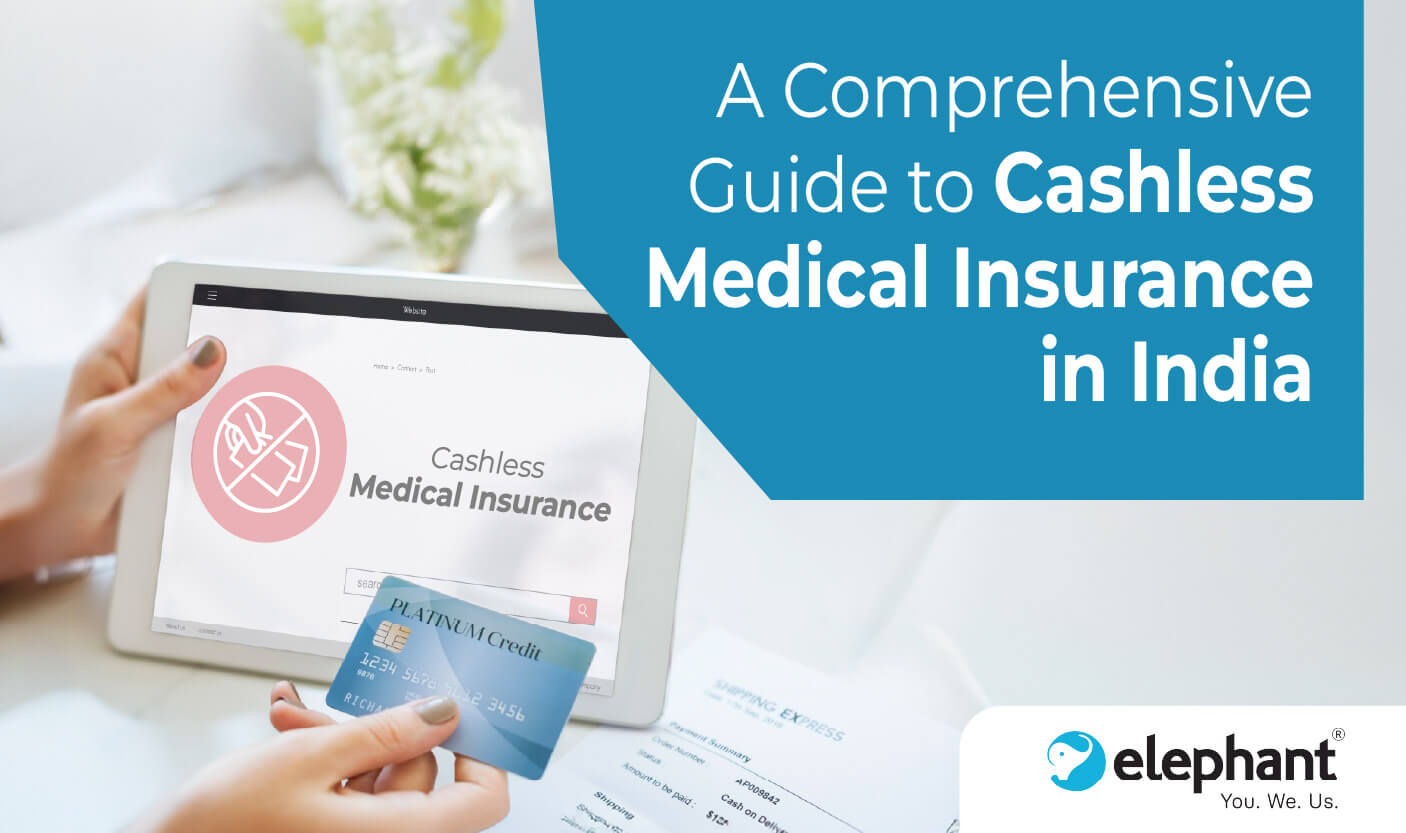-
CAR INSURANCE
Car InsuranceFlat 80%* OFFGet right cover at best price on your car insurance policy. Unlock your corporate superpower today.GET QUOTESWhat does your car insurance cover you for?Comprehensive coverageLiability coveragePersonal accident coverageZero-depreciation coverMany more add-on coversGet your car insured with the best features - completely online, right now!CloseWhat do you get at Elephant Insurance?Corporate Superpower of best Car Insurance DealsAI-Based Car Insurance RecommendationsHandpicked Insurers for Car InsuranceUnmatched Prices on Car Insurance PremiumsInstant Policy Issuance for your vehicle100% Assistance from ExpertsDigital Relationship ManagerBest-in-Class Claims ServiceLifetime Personalised AccountRenewal Management
-
TWO-WHEELER
INSURANCE
Two-Wheeler InsuranceStarting at Rs.546* only.Get right cover at best price and insure your two-wheeler for a joy ride. Unlock your corporate superpower today.GET QUOTESWhat does your two-wheeler insurance cover you for?Comprehensive coverageLiability coveragePersonal accident coverageZero-depreciation coverMany more add-on coversGet your two-wheeler insured with the best features - completely online, right now!CloseWhat do you get at Elephant Insurance?Corporate Superpower of best Two-wheeler Insurance DealsAI-Based Two-wheeler Insurance RecommendationsHandpicked Insurers for Two-wheeler InsuranceUnmatched Prices on Two-wheeler Insurance PremiumsInstant Policy Issuance for your vehicle100% Assistance from ExpertsDigital Relationship ManagerBest-in-Class Claims ServiceLifetime Personalised AccountRenewal Management
-
TERM LIFE
INSURANCE
Term Life InsuranceRs.1 crore life cover at Rs.503/month* only.Securing your loved ones future is not expensive, it is priceless! Be a superhero by unlocking your corporate superpower today.GET QUOTESWhat does your term life insurance cover you for?Death benefitsCritical illnesses coverAccidental death benefitWaiver of premiumMany more add-on coversGet your term life insurance with the best features - completely online, right now!CloseWhat do you get at Elephant Insurance?Corporate Superpower of best Term Life Insurance DealsAI-Based Term Life Insurance RecommendationsHandpicked Insurers for Term Life InsuranceHandpicked Insurers for Term Life InsuranceInstant Policy Issuance for you and your family100% Assistance from ExpertsDigital Relationship ManagerBest-in-Class Claims ServiceLifetime Personalised AccountRenewal Management
-
HEATLH
INSURANCE
Health InsuranceGet Rs.5 lakh health cover at Rs.18/day* only.Protecting your health is always our priority. Be a superhero by unlocking your corporate superpower today.GET QUOTESWhat does your health insurance cover you for?Unexpected medical billsPre and post hospitalisation billsDay care treatmentsMaternity, newborn care and organ donor expensesMany more add-on coversGet your health insurance with the best features - completely online, right now!CloseWhat do you get at Elephant Insurance?Corporate Superpower of best Health Insurance DealsAI-Based Health Insurance RecommendationsHandpicked Insurers for Health InsuranceUnmatched Prices on Health Insurance PremiumsInstant Policy Issuance for you and your family100% Assistance from ExpertsDigital Relationship ManagerBest-in-Class Claims ServiceLifetime Personalised AccountRenewal Management
-
CYBER PROTECT
Cyber Protect InsuranceGet Rs.1 lakh cyber protection cover at Rs.55/day* only.Don't be a victim of cyber fraud! Get right cover at best price on your cyber insurance policy. Unlock your corporate superpower today.GET QUOTESWhat does your cyber insurance cover you for?Legal protectionUnauthorised online transaction coverPhishing and email spoofing coverCyber stalking and identity theft coverCyber extortion and many more coveragesGet your cyber insurance with the best features - completely online, right now!CloseWhat do you get at Elephant Insurance?Corporate Superpower of best Cyber Insurance DealsAI-Based Cyber Insurance RecommendationsHandpicked Insurers for Cyber InsuranceUnmatched Prices on Cyber Insurance PremiumsInstant Policy Issuance for your cyber protection100% Assistance from ExpertsDigital Relationship ManagerBest-in-Class Claims ServiceLifetime Personalised AccountRenewal Management
-
OTHER
PRODUCTS5
Critical Illness InsuranceA must-have protection to secure you against critical illnesses.GET QUOTESPersonal Accident InsuranceAccidents are sudden and can cause damage to your financial planning as well.GET QUOTES
Health Insurance Blogs
Helping you to make informed decisions about insurance

How to buy health insurance in Hyderabad: A Comprehensive Guide
published on January 21, 2025
There is a rapid growth in the healthcare sector of the bustling metropolis of Hyderabad which houses a rich culture and IT hub. To protect yourself and your family members from the financial challenges that may occur due to unforeseen medical costs, it is essential that you acquire a health insurance.
In order to provide valuable insights into the different types of health insurance policies available to you, factors and steps you may need to consider and to help you understand the process of acquiring a policy, this guide will assist you throughout.
In India, health insurance serves as a financial cushion, providing coverage for various hospitalization-related medical costs. Having a financial safety net in case of sickness or injury gives you peace of mind.
Benefits of Having Health Insurance in Hyderabad
-
Financial Protection:
-
Cashless Hospitalization:
-
Tax Benefits:
To ensure that you don’t deplete your financial savings due to unforeseen medical costs, health insurance comes into play.
Access to Quality Healthcare:
Quality hospitals and health specialists can be acquired as health insurance opens up multiple such options.
The need for upfront payments is eliminated as many health insurance plans offer cashless hospitalization facilities.
There are numerous tax benefits that one can get for health insurance premiums under Section 80D of the Income Tax Act.
Also Read: Understanding Tax Benefits: How Health Insurance Impacts Your Taxes
Types of Health Insurance Plans in Hyderabad
-
Several types of health insurance plans are available in Hyderabad:
-
Individual Health Insurance:
-
Family Floater Health Insurance:
-
Senior Citizen Health Insurance:
-
Critical Illness Insurance:
A single individual is covered under this plan.
Under a single policy, multiple members of the family are covered.
A policy that caters especially to elderly people.
Upon diagnosis of critical illness, a lumpsum amount is paid to the individual.
Factors to Consider When Buying Health Insurance in Hyderabad
-
Sum Insured:
-
Network Hospitals:
-
Pre-existing Conditions:
-
Add-on Covers:
-
Premium Cost:
-
Claim Settlement Ratio:
Based on your age, health history, and the size of your family, choose an insured sum that perfectly covers the medical costs.
For convenient access to cashless treatments, opt for a plan that covers a wider range of network hospitals in Hyderabad.
Check if the policy you are acquiring covers pre-existing conditions and check if there’s a waiting period.
Take into consideration additional optional health insurance riders like maternity benefits, personal accident cover, or dental coverage.
In order to find the best deal, compare premiums from different insurers.
To understand the efficiency of the health insurance policy thoroughly research the insurance company’s claim settlement ratio.
Also Read: Things to consider while buying health insurance plans
Steps to Buy Health Insurance in Hyderabad
-
Assess Your Needs:
-
Compare Plans:
-
Choose a Plan:
-
Submit Documents:
-
Pay Premium:
Based on factors like your age, health, and size of the family, determine your coverage requirements.
Compare premiums, features, and network of hospitals after obtaining multiple quotes from different insurance companies.
Choose a plan that best aligns with your needs and budget.
Important documents like age proof, income proof, and medical records should be furnished and provided to the insurance company (if applicable).
To activate your insurance policy, make the initial premium payment.
Tips for Managing Your Health Insurance
- Renew your policy in a timely manner.
- Update your insurer about any changes.
- Read your policy and understand the terms and conditions thoroughly.
- Take advantage of all the benefits offered to you under the health policy
- Utilise online services for easy policy management and claims submission.
Conclusion
Buying health insurance in Hyderabad is necessary to protect your financial health. Understanding the various kinds of plans, considerations, and steps can help you choose a policy that suits your specific needs and make an informed decision. Keep in mind, that purchasing a health insurance policy is a way to invest in your well-being and mental stability.
Do you want to know about the health insurance options available to you? Reach out to us by calling 1800 266 9693 via phone or email us at support@elephant.in for further information, or browse Elephant.in website!
*Terms and conditions apply. The information provided in this article is generic in nature and for informational purposes only. It is not a substitute for specific advice in your own circumstances. You are recommended to obtain specific professional advice from before you take any/refrain from any action. Tax benefits are subject to changes in tax laws. Please contact your tax consultant for an exact calculation of your tax liabilities.| EL/BLOGS/24-25/22

A Comprehensive Guide to Cashless Medical Insurance in India
published on January 18, 2025
In today’s increasingly rapid society, having health insurance is crucial because unforeseen medical crisis can occur, putting families at risk financially. Cashless health insurance, a widely favored and convenient choice, provides a security blanket by paying for medical costs without the need for initial payments. Policyholders have the option to get treatment at network hospitals, where the insurance provider will directly pay the bill, instead of paying upfront and waiting for reimbursement later, making the process easier and less stressful.
This guide will provide a comprehensive explanation of cashless medical insurance for individuals who are not familiar with health insurance, covering its definition, advantages, functioning, and important takeaways. Having this information allows you to make educated choices and guarantee that you and your loved ones are financially secure in the event of medical emergencies.
What is Cashless Medical Insurance?
Cashless health insurance policy is a kind of medical insurance that allows policyholders to get treatment without making immediate payments. Instead of paying hospital bills upfront and seeking reimbursement after, the insurance company pays the hospital bill directly. Healthcare providers partnered with the insurance company offer this service at in-network hospitals.
In a place such as India, where healthcare costs can be burdensome, cashless health insurance offers significant relief. In times of crisis, it guarantees access to vital medical treatment without the burden of raising money.
How Cashless Medical Insurance Works
-
Network Hospital Selection:
Treatment under cashless medical insurance is applicable only at in-network hospitals, part of the insurance company’s approved list. Every insurance provider offers a list of network hospitals where the cashless facility can be availed.
-
Hospitalization Process:
For planned hospitalization, advance notice (usually 48-72 hours prior to admission) needs to be provided to the insurance company. In the case of emergency hospitalization, this can be done within 24 hours. Once a network hospital is selected, a pre-authorization form, completed with the assistance of the hospital’s insurance desk, will be submitted to the insurance company for approval.
-
Approval by the Insurance Provider:
After receiving the pre-authorization form, the insurance company verifies that the treatment is covered under the policy. Upon approval, the bill settlement between the hospital and the insurance company takes place directly. The amount covered depends on the sum insured and the policy terms.
-
Final Settlement and Discharge:
After treatment, the hospital sends the final invoice to the insurance provider for settlement. Any costs not covered by the policy, such as consumables or registration fees, must be paid separately. Once the settlement is complete, the patient is discharged without having to pay large bills upfront.
Also Read: Things to know about cashless health insurance
Benefits of Cashless Medical Insurance
-
No Upfront Payments:
One of the biggest advantages is the elimination of the need to arrange funds during medical emergencies, as the expenses are settled directly between the insurance provider and the hospital.
-
Convenience:
Cashless Health insurance reduces paperwork related to reimbursement claims, simplifying the process by avoiding the submission of multiple documents and bills after treatment.
-
Access to Quality Care:
Cashless health insurance provides access to reputed hospitals, ensuring quality healthcare services.
-
Immediate Financial Relief:
Cashless health insurance offers immediate financial support, allowing patients and families to focus on treatment and recovery during medical emergencies.
-
Wide Network of Hospitals:
Leading insurance companies in India have a vast network of hospitals, ensuring the cashless facility can be accessed nationwide, including at multispecialty providers.
Types of Treatments Covered by Cashless Medical Insurance
A wide range of medical treatments is typically covered by cashless medical insurance. Common treatments include:
-
Hospitalization Costs:
Inpatient stay, nursing charges, doctor’s consultation fees, and surgery costs.
-
Pre- and Post-Hospitalization Expenses:
Medical expenses incurred before and after hospitalization, generally for a specified number of days.
-
Daycare Treatments:
Procedures not requiring 24-hour inpatient hospitalization, such as cataract surgery, dialysis, or chemotherapy.
-
Ambulance Charges:
Emergency transportation to the hospital via ambulance is often included in the policy.
-
Diagnostics and Medications:
Some policies cover diagnostic tests and prescribed medications during hospitalization.
Also Read: Things to consider while buying health insurance plans
Points to Consider When Opting for Cashless Medical Insurance
-
Network Hospitals:
Review the list of in-network hospitals before purchasing a policy to ensure that nearby, efficient, or preferred hospitals are part of the insurer’s network.
-
Claim Process Understanding:
Familiarity with the claim process is essential. Understand the time limits for notifying the insurance provider about planned or emergency hospitalization.
-
Coverage and Exclusions:
Read the policy carefully to understand what is covered. Some treatments or pre-existing conditions, like dental care, may be excluded.
-
Sub-Limits:
Some policies include sub-limits on treatments or hospital room types. For example, coverage may only extend to a shared room, and choosing a private room could result in additional costs.
-
Pre-Authorization:
Timely pre-authorization is crucial for a smooth cashless claim process. Completing this step can help avoid delays during hospitalization.
-
Partial Coverage:
Be mindful that not all expenses are covered under cashless insurance. For instance, toiletries, consumables, or registration fees may need to be paid out of pocket.
Conclusion
Selecting the right policy aligned with personal and family healthcare needs is an essential step in ensuring adequate coverage. A policy with a comprehensive network of hospitals, familiarity with the claim process, and awareness of sub-limits and exclusions is vital to maximizing the benefits of cashless medical insurance.
Are you interested in knowing what health insurance choices you have? For additional information, visit Elephant.in or give 1800 266 9693 a call or send an email to support@elephant.in!
*Terms and conditions apply. The information provided in this article is generic in nature and for informational purposes only. It is not a substitute for specific advice in your own circumstances. You are recommended to obtain specific professional advice from before you take any/refrain from any action. Tax benefits are subject to changes in tax laws. Please contact your tax consultant for an exact calculation of your tax liabilities.| EL/BLOGS/24-25/21

Does Health Insurance Premium Increase with Age?
published on January 16, 2025
In order to protect yourself from the weight of medical expenses, getting health insurance is essential. Your health insurance premium changes as you grow older due to growing health risk concerns. To understand how age plays a key role in determining insurance premiums in India, we are going to take you through the relationship between age and insurance costs in this blog.
What are Health Insurance Premiums?
Payments that you make periodically to your particular insurance company for protection are called health insurance premiums. The type of coverage you choose, your lifestyle, age and state of health are certain factors upon which these premiums are calculated.
Determining Premiums: Age is a Key Factor
One of the main factors that affect health insurance premiums primarily is age. Your risk of a health issues arising increases as you grow older. When setting premium costs, insurance company take into consideration this increased risk. This is why age plays a key role:
-
Increased Risk of Health Issues:
-
Government Health Schemes:
Age related diseases like hypertension, heart problems and diabetes are more common in older individuals. It leads to higher claim costs for the insurance companies as treatments for these kind of diseases are costly.
Subsidized premiums are offered to senior citizens by some government health insurance schemes. However, certain limitations are implied on network hospitals and on coverage under these schemes.
Impact of Age on Premium Calculations
To calculate premiums based on various factors, including age, insurance companies utilize the actuarial models. Statistical probability of health insurance policy claims at different age groups are considered by these models. Your health insurance premiums may increase gradually to be in tune with the higher risk associated with the age group you are in as you age.
There are several other factors that influence your health insurance premium, leaving aside the most important factor that is age:
-
Health Status:
-
Lifestyle:
-
Sum Insured:
-
Network Hospitals:
You can be subjected higher premiums if there is a pre-existing medical condition or a family history of certain diseases.
Having a habit of smoking, consuming alcohol, or a sedentary lifestyle can lead to an increase in health risks and which in turn leads to an increase in premiums.
Having a high premium means that the sum insured is also high. An adequate sum insured should be chosen to make sure that the medical expenses are covered.
A greater flexibility in accessing healthcare is provided if an insurance plan with a wider network of hospitals is chosen but at the same time, the premiums for the same will be higher.
Steps to Manage Your Health Insurance Premium as You Age
- Lower premiums can be achieved for long term if you purchase health insurance at a young age.
- You can implement premium reduction tactics for health insurance by maintaining a healthy lifestyle, which can help lower your health risks.
- To make sure your health insurance policy is updated as per your health requirements, conduct frequent reviews.
- Subsidized premiums are offered to senior citizens under certain government health insurance schemes. Consider exploring those.
Conclusion
Despite being a significant factor, age is not the sole determinant of health insurance premiums. By understanding the various factors that impact your premium, you can make informed decisions when selecting a health insurance plan that provides adequate coverage at a reasonable price. Remember that prioritizing your health and leading a healthy lifestyle can help reduce the impact of aging on your insurance.
Are you curious about the benefits that health insurance could provide? To get more details, check out Elephant.in or contact 1800 266 9693 or email support@elephant.in!
*Terms and conditions apply. The information provided in this article is generic in nature and for informational purposes only. It is not a substitute for specific advice in your own circumstances. You are recommended to obtain specific professional advice from before you take any/refrain from any action. Tax benefits are subject to changes in tax laws. Please contact your tax consultant for an exact calculation of your tax liabilities.| EL/BLOGS/24-25/20

Buying Health Insurance in Pune: Your Quick and Simple Guide
published on December 27, 2024
The vibrant city of Pune is famous for its lively culture and its ever growing healthcare facilities. In order to safeguard yourself and your family from unexpected hospitalization costs it is essential that you get yourself and your family a health insurance when living in Pune.
The process of acquiring health insurance, valuable information on various policies available, key factors to consider and the important steps to purchase will be highlighted in this blog post.
Understanding Health Insurance in Pune
To pay for various medical costs and hospitalisation costs, health insurance plans come into the play as a form of financial protection during such unexpected situations. Peace of mind can be achieved in situations where one is injured or sick due to the protection provided by the health insurance.
Benefits of Having Health Insurance in Pune
-
Financial Protection:
To avoid using up your savings and to pay for expensive medical expenses a health insurance is a must.
-
Access to Quality Healthcare:
Top notch hospitals and expert treatment can be utilised if one has a health insurance.
-
Cashless Hospitalization:
Cashless hospitalizations services can be availed which removes the necessity of making advance payments when one has health insurance.
-
Tax Benefits:
Through Section 80D of the Income Tax Act, the Indian government grants tax benefits for health insurance premiums
Types of Health Insurance Plans in Pune
In Pune, different kinds of health insurance policies can be found:
-
Individual Health Insurance:
Only an individual will be apt for this kind of coverage.
-
Family Floater Health Insurance:
All family members will be insured under this type of insurance coverage.
- For elderly individuals, this is specially created for elderly individuals./li>
-
Critical Illness Insurance:
In cases of serious illnesses, Critical Illness Insurance give a one-time payment to cover for the medical expenses.
Factors to Consider When Buying Health Insurance in Pune
-
Sum Insured:
To cover your medical costs considering your age, health factors and family size, select a proper sum insured.
-
Network Hospitals:
Choose a plan with an extensive hospital network in Pune for easy access to cashless medical care.
-
Pre-existing Conditions:
Make sure to verify coverage and waiting period for pre-existing conditions.
-
Add-on Covers:
Consider additional options such as maternity benefits, personal accident coverage, or dental insurance.
-
Premium Cost:
In order to choose the most favourable options, compare various insurance options and their rates.
-
Claim Settlement Ratio:
To comprehend an insurance company’s promptness, do a thorough investigation of their claim settlement ratio.
Also Read: A Step-By-Step Guide To Navigating Health Insurance Claims
Steps to Buy Health Insurance in Pune
-
Assess Your Needs:
Determine the required level of coverage by taking into account your age, health, and the size of your family.
-
Compare Plans:
Obtain quotations from many insurance companies, then compare the variations in features, costs, and coverage within the network.
-
Choose a Plan:
Select the solution that most closely matches your needs and budget.
-
Submit Documents:
Send in the proper paperwork, including proof of age, evidence of income, and (if needed) medical records.
-
Pay Premium:
Submit the first premium payment in order to initiate your policy.
Also Read: Factors Influencing Health Insurance Premiums: What You Need to Know
Tips for Managing Your Health Insurance
-
-
Renew Your Policy Timely:
To prevent gaps in coverage and ensure continuous benefits.
-
Update Your Insurer:
Notify your insurance provider of any updates to your address, health condition, or family information.
-
Read Your Policy:
Familiarize yourself with the policy’s terms and conditions to prevent confusion when making claims.
-
-
Maximize Benefits:
Utilize all the advantages provided by your health insurance coverage.
-
Utilize Online Services:
Numerous insurance companies provide online platforms for convenient management of policies and submission of claims.
Conclusion
Buying health insurance in Pune is necessary to protect your financial stability. Understanding the various kinds of plans, factors to think about, and steps included can help you make a knowledgeable choice and obtain a thorough policy that fits your exact requirements. Don’t forget, having a health insurance policy is a way to invest in your well-being and mental calmness.
Do you have interest in exploring the health insurance policies available to you? Get in touch with Elephant.in either by calling 1800 266 9693 or sending an email to support@elephant.in for more information, or simply visit Elephant.in!
*Terms and conditions apply. The information provided in this article is generic in nature and for informational purposes only. It is not a substitute for specific advice in your own circumstances. You are recommended to obtain specific professional advice from before you take any/refrain from any action. Tax benefits are subject to changes in tax laws. Please contact your tax consultant for an exact calculation of your tax liabilities.| EL/BLOGS/24-25/19

Buying Health Insurance in Delhi Made Easy: Here’s How
published on September 25, 2024
The bustling metropolis of Delhi also has serious health issues. Due to rising medical care costs and pollution, many view health care coverage as imperative. We will help you in understanding the steps and things to look out for while purchasing health insurance in Delhi through our blog post.
Are You Buying Health Insurance? Consider These Factors:
-
Sum Insured:
This shows the maximum amount your insurance company will pay for medical bills over a full year. A bigger insured sum is associated with more comprehensive coverage.
-
Coverage:
Analyze the insurance details thoroughly. While many plans cover hospital stays, surgeries, and prescription meds, others may also cover dental care, maternity care, and coverage for severe illnesses.
-
Network Hospitals:
Your insurance company is connected to these medical facilities. Selecting a provider from the network helps streamline the claims process and perhaps save expenses.
-
Waiting Period:
Some claims, such as those involving pre-existing conditions, can be filed within this time frame.
-
Premium:
This is the sum you pay the insurance supplier to keep up with the contract’s status. Comparing the premiums offered by various suppliers is essential.
Also Read: A Step-By-Step Guide To Navigating Health Insurance Claims
Choosing the Right Plan
Health insurance plans come in various forms. Common types include:
- Individual Health Insurance: Tailored for single individuals.
- Family Floater Plan: Covers you, your partner, and your dependent children under a single insurance.
- Senior Citizen Health Insurance: Health insurance specifically created for older individuals.
Numerous factors, including age, the number of family members, existing medical conditions, and financial status, influence which plan is ideal.
Things to Look Out for When Purchasing Health Insurance
-
Comprehensive Comparison:
Evaluate the premiums, hospital network, and claim settlement rates of various insurance companies along with their coverage.
-
Meticulous Policy Review:
Thoroughly understand the policy terms and conditions before purchase.
-
Reputable Insurer Selection:
Prioritize insurers with a proven track record of claim settlements.
-
Exploring Add-on Covers:
Consider supplementary covers like critical illness, personal accident, or maternity for enhanced protection.
-
Regular Policy Assessment:
As life evolves, so do insurance needs. Periodically review your policy to ensure it aligns with your changing requirements.
The Claim Process
Quickly informing your insurance provider is essential if there is a medical emergency. A few guarantors give the choice of hospitalization without cash at clinics inside their organization. In cases without a credit only office, you might need to pay for costs forthright and afterward look for repayment from the insurance agency.
Also Read: 10 Sneaky Reasons Your Health Insurance Claim May Not Get Approved
Conclusion
Despite the fact that purchasing health insurance can be overwhelming, it is necessary for financial readiness. By completely surveying your needs, assessing various choices, and picking a dependable insurance agency, you can establish a strong health insurance foundation for yourself as well as your friends and family.
Please feel free to call us at 1800 266 9693 or email support@elephant.in with any questions. For excellent choices for vehicle insurance, visit Elephant.in!
*Terms and conditions apply. The information provided in this article is generic in nature and for informational purposes only. It is not a substitute for specific advice in your own circumstances. You are recommended to obtain specific professional advice from before you take any/refrain from any action. Tax benefits are subject to changes in tax laws. Please contact your tax consultant for an exact calculation of your tax liabilities.| EL/BLOGS/24-25/16

Factors Influencing Health Insurance Premiums: What You Need to Know
published on August 30, 2024
Health care expenses are spiraling day by day. In modern India, a health insurance plan has indeed become more of a need than a luxury. Not to forget that it actually is a financial shield, saving you from the burden of medical bills due to any mishap, for example, hospitalization or falling ill. But as new and established insurance companies alike pitch all manner of health insurance plans, at least one question seems to keep arising: Which is best, and how much is it going to cost me?
It doesn’t matter; we are there to help you. Various factors have a bearing on health insurance premiums in India, thus providing you with three sources to make an empowered decision while choosing a health insurance plan. You will be able to compare plans with purpose and choose the best health insurance policy that works well for you and your pocket.
Health Insurance Premiums
A health insurance premium may simply be put in the same league with the price a person is to pay in regards to a linsurance company on a monthly or annual basis in order to receive coverage. Such coverage assures one of compensation up to a pre-determined limit whenever the individual falls ill or needs admission into a hospital for due reasons. Your premium is likely, in most cases, to dictate just how comprehensive your cover turns out to be.
Factors Affecting Your Health Insurance Premium
The health insurance premium depends upon a various factors. Let us discuss some of the most important ones:
-
Age:
In general, premium rates for health insurance are charged on a lower rate for the younger age group in comparison to older people. This is because, with an increase in age, the risk for hospitalization and the associated medical cost increases.
-
Your Health Status:
If you enjoy the best premiums; then your pre-existing conditions, if any, may lead you into hefty premiums, as the company estimates probability.
-
Your Lifestyle:
Such habits as smoking or using tobacco will raise your premiums in a huge way. This is because such activities are dangerous to your health status.
-
Sum Insured:
This is the maximum amount that an insurance company is inclined to pay toward any treatment expenses. Quite normally, the higher the sum insured, the higher the premium, which in turn should ensure adequate coverage.
-
Your Policy Coverage:
The premium will be less for a basic policy with restricted coverage as compared to comprehensive policies covering a wide scope of benefits, including pre- and post-hospitalization expenses or critical illness cover.
-
Your Location:
Geographical location may have an impact on your medical costs; it differs by city or region. So in case you reside in a metro city with higher healthcare costs, your premium may turn out a bit on the higher side.
-
Claim History:
A history of regular claims often makes insurance companies take it as an indicator to place you at an above-average risk, for which they might go ahead and increase the premium upon renewal.
Cost vs. Coverage: The Trade-Off
The more competitive premium may be inviting, but here is a trade-off between cost and cover: one with a low enough premium in a basic plan will not give any significant coverage against serious medical conditions that might demand high-cost treatment.
Tips for Managing Your Health Insurance Premium
Here are some extra pointers to keep your health insurance premium in check:
- Assess your medical requirements and select a plan that provides sufficient coverage without superfluous features
- Maintaining excellent habits and living a healthy lifestyle will help you save money on premiums over time
- Never accept the first plan you come upon. To compare costs and coverage choices, get quotations from many insurance providers
- A family floater plan might be an affordable choice if you have a family because it covers several individuals under a same policy
- If you didn’t file any claims the year before, many insurance companies may give you a No Claim Bonus on your Health Insurance renewal premiums
Conclusion
Once you understand what creates variations in your health insurance premiums, you will be better equipped to make informed decisions while choosing a plan. Keep in mind that the best health insurance plan is not about the affordability but the proper balance between cost and comprehensive coverage based on the needs of the buyer. There are so many ways to be smart about your health; one of these is to choose a health insurance plan that’s got your back—and your family’s—in case any medically unexpected situation arises.
*Terms and conditions apply. The information provided in this article is generic in nature and for informational purposes only. It is not a substitute for specific advice in your own circumstances. You are recommended to obtain specific professional advice from before you take any/refrain from any action. Tax benefits are subject to changes in tax laws. Please contact your tax consultant for an exact calculation of your tax liabilities.| EL/BLOGS/24-25/14

What is the Grace Period in Health Insurance Plans?
published on August 8, 2024
Certain terms and conditions in health insurance may make it more complicated to understand the process. The grace period is one such term that you will come across. In essence, it is very important to understand what the grace period really means for your health insurance plan, as this could impact your coverage and financial stability.
What is the Grace Period?
The grace period in health insurance stands for an extension time allowed to policyholders after the due date to pay their premiums. During this time, the insurance coverage is still active, and one cannot be penalized for being unable to pay at the deadline. Consider this a safety net that keeps your health insurance from becoming terminated with prejudice over an innocent mistake of lateness.
What is the Grace Period Duration?
The grace period accorded on the insurance policy differs with each insurance company and the type of policy taken. The grace periods normally vary between 30 to 90 days (about 3 months). To find out how long the grace period for your policy is one needs to read through the policies in possession or contact the company that underwrites the policy.
Also Read: What is Restoration Benefit in Health Insurance?
Why is the Grace Period Important?
The grace period is meant to cushion the policyholder. Life is normally full of ups and downs, and at times, one may be in a difficult financial situation or forgetful, hence making him or her miss the payment. It goes without saying that a grace period means you’ll still enjoy health coverage during those days, and there are no existing gaps putting you at great risk in the event of a medical emergency.
What Happens in the Grace Period?
You have the grace period frame for medical insurance inclusion; subsequently, you can go on with your clinical care, and your claims will keep getting processed as usual. Here one must make a note that for whatever reason if you falter in paying your premium by the end of the grace period, it is most definite that your insurance policy will be rendered null and void.
Impact on Claims and Coverage
Though your policy may be valid during the grace period, in some instances, insurers may delay processing your claims until and unless the past dues are paid. Simply put, you can avail of medical services, but the payment to the health provider can be stalled till the payment of the premium.
Also Read: Things to consider while buying health insurance plans
What if You Miss the Grace Period?
Not paying within the grace period could be a big deal. It probably means that your health insurance policy will be terminated, and you hence will have no more coverage. This, of course, can be very tricky if you have ongoing medical needs or should any unexpected health issue arise. Furthermore, should your policy be terminated, in most cases you will be left waiting for the next enrollment period to sign up for a new one, meaning that you will be without coverage for an extended period.
Reinstatement of Coverage
Some insurers give policyholders the opportunity to reinstate a policy if coverage has been cancelled for non-payment. In most cases, this would mean paying not only the back premium due but quite often a reinstatement fee. Reinstatement is not automatic and may not be guaranteed, and the terms can vary from one insurance company to another. It is best not to rely on this option and instead ensure that premiums are paid on time.
How to Avoid Missing a Payment
-
Set Up Automatic Payments:
Most insurance companies provide a provision for making automatic payments directly through your account, paying a set amount each month or on the due date of your premium.
-
Use Payment Reminders:
If you are one who does not like automated payments, set your phone or calendar to remind you a few days before payment.
-
Premium Budget:
Create a budget each month that includes your insurance premium. That way the actual premiums won’t shock you because they won’t be a surprise when they are due for payment.
-
Talk to Your Insurer:
If you find that you’re not going to be able to make a payment, go ahead and call your insurer. They might have payment plans or another resolution to keep you covered.
Also Read: Premium Reduction Tactics for Your Health Insurance Plan
Special Considerations
Please be aware that grace periods differ depending on the different classes of health insurance plans. For example, the ones sold through the Health Insurance Marketplace come with a 90-day grace period if one is granted advance payment of the premium tax credit; but again, this does not mean that one needs to apply for any other type of plan.
Other state laws may have some impacts on grace periods. Some states by law specify the shortest duration that a health insurance cover can provide, thereby enhancing more protection for policyholders.
Conclusion
The grace period refers to a time frame within which health insurance plans pardon policyholders if they pay their premiums late. You must exactly know how it works and be proactive in paying your premiums to avoid any further distractions. This way you can assure yourself of continuous health coverage, leaving worries of lapsed policies behind. Always review your specific policy details and talk to your insurance company for further information and protection.
Call 1800 266 9693 or email us at support@elephant.in if you have any questions. Visit Elephant.in for the best car insurance plans!
*Terms and conditions apply. The information provided in this article is generic in nature and for informational purposes only. It is not a substitute for specific advice in your own circumstances. You are recommended to obtain specific professional advice from before you take any/refrain from any action. Tax benefits are subject to changes in tax laws. Please contact your tax consultant for an exact calculation of your tax liabilities.| EL/BLOGS/24-25/11

How to Secure Best Health Insurance Plan in Mumbai: A Detailed Guide
published on July 18, 2024
In a bustling city like Mumbai, where a significant population leads busy lives, a health issue could emerge unexpectedly. Due to the increased cost of healthcare in the metropolis, an individual will have to pay a large amount of money to treat these health concerns. You must get health insurance if you want to ensure that this health risk does not deplete all of your funds and if you want to keep your financial security.
This blog post’s goal is to educate you about health insurance and provide some advice and considerations for when you get health insurance in Mumbai.
Understanding the Coverage Options
Having health insurance helps shield you from the financial strain of unexpected medical costs should you need to be admitted to the hospital to treat your illness. You will encounter two primary categories of health insurance plans:
-
Indemnity Plans:
Up to the maximum insured sum, the insurer consents to pay the insured person’s medical bills. The payment will be handled as soon as the insurance receives the invoices for the medical costs.
-
Benefit-Based Plans:
These schemes provide a predetermined payout when a claim is made, typically given all at once. These plans become effective and provide a set benefit based on the room and amenities chosen during hospitalisation.
Also Read: Understanding Coverage Options & Benefits of Family Health Insurance
Why You Should Get Health Insurance
Acquiring health insurance has various benefits. They are as follows:
-
Financial Protection:
Clinical expenditures associated with specific therapies or hospital stays in Mumbai may be high. By paying for these costly clinical expenses, health care coverage takes the monetary weight off the safeguarded party’s shoulders.
-
Stress-free Recovery:
Having health insurance will take care of any financial issues that come up in a medical crisis, allowing you to concentrate on getting better instead of thinking about costs.
-
Access to Quality Care:
Health insurance simplifies the process of receiving top-notch medical care, including hospital visits, treatments, prescriptions, etc., as the insurance provider covers the costs.
-
Tax Reductions:
You also receive specific tax benefits for health insurance for yourself. According to section 80D of the Income Tax Act, the government of India allows tax deductions for health insurance premiums paid for both yourself and your dependents.
Selecting a Health Insurance Plan in Mumbai: Key Considerations
Take into account the following factors before buying and obtaining health insurance in Mumbai:
-
Age and Overall Health:
While choosing health care coverage, it is fundamental to consider an individual’s age and health conditions. A young, healthy individual only needs basic health insurance coverage. It is recommended to acquire a comprehensive plan if an individual has a family background of illnesses or has concerns about potential future risks.
-
Insured Sum:
The insured amount is the money that the insurer will compensate for during a health emergency. Keep in mind the various hospitalisation costs in Mumbai and any existing health conditions when selecting the proper amount of insurance.
-
Coverage Options:
Numerous coverage choices are available with health insurance policies. Select a health insurance policy that takes into account your unique requirements as well as potential health risks.
-
Network Hospitals:
Pick a health policy that offers a broad network of medical clinics in Mumbai, consisting of both private and public choices. This ensures that you can use credit-only hospitalisation benefits by getting quality medical services suppliers in the network.
Also Read: Premium Reduction Tactics for Your Health Insurance Plan
-
Claim Settlement Ratio (CSR):
Examine the Claim Settlement Ratio (CSR) of different insurance firms. A high CSR demonstrates that the insurer settles guarantees quickly and efficiently.
-
Premium Cost:
Costs for health insurance vary according to the factors mentioned before. Even though cost is important, it is essential to priorities adequate coverage over a lower premium for long-term financial stability.
Conclusion
Health insurance is very important, especially in a city like Mumbai where the population is rising, posing a major risk of accidents happening and where life is so fast-paced. Keep in mind that getting comprehensive health insurance is one way to give your overall health priority.
Please feel free to contact our experts at support@elephant.in or by contacting our hotline at 1800 266 9693 if you have any further queries! Elephant.in is the best place to get health insurance rates!
*Terms and conditions apply. The information provided in this article is generic in nature and for informational purposes only. It is not a substitute for specific advice in your own circumstances. You are recommended to obtain specific professional advice from before you take any/refrain from any action. Tax benefits are subject to changes in tax laws. Please contact your tax consultant for an exact calculation of your tax liabilities.| EL/BLOGS/24-25/10

What is Restoration Benefit in Health Insurance?
published on July 4, 2024
As healthcare expenses continue to increase in India, individuals must have sufficient healthcare coverage to ensure that they are financially protected at times of a medical crisis. Normally, basic health insurance covers hospital stays but may not fully cover expensive treatments for severe medical illnesses. This is the moment when restoration benefits come in handy – they can significantly boost your coverage and provide crucial financial protection in case of a major medical emergency.
This article explores the specifics of the advantages of restoration in Indian health insurance schemes, assisting you in making informed decisions while choosing your best health insurance plan.
The Challenge of Exhausted Sum Insured
In certain situations, you can face exhaustion of the sum insured. The situations are as follows:
Severe Health Problems:
Certain extreme health conditions demand extended stays at the hospital which in turn is costly (diseases like cancer, heart problems, etc.). The original sum assured might not cover all the costs associated with the therapy.
Rising Medical Costs:
The issue of medical inflation is always a worry. Nowadays, the prices of health procedures and visits to the hospital are getting costlier. The sum insured under the insurance coverage you have opted for may not be enough to cover the pricey cost of treatments that you might need in the future.
Multiple Hospitalisations:
If you are in a situation where you have multiple health problems at once or are frequently paying a visit to the hospital, the actual sum insured amount will be inadequate and can drain quickly.
What is Restoration Benefit in Health Insurance?
The restoration benefit provides a fresh sum insured in specific circumstances, overcoming the drawbacks of conventional health insurance plans. Here is an explanation of its functioning:
An Add-on Feature:
Typically, restoration benefit is provided as an additional rider that can be bought in conjunction with your primary health insurance coverage. It is not a common inclusion in every policy.
Renewal of Sum Insured:
When you use up the original coverage amount because of a hospital stay, the restoration benefit serves as a safety cushion. It basically refreshes your coverage amount, providing you with extra financial protection for additional treatment in the current policy period.
Types of Health Insurance Restoration Benefits
Health insurance companies in India provide two primary categories of restoration benefits:
Partial Restoration:
This form of restoration coverage provides a partial refill of the original coverage amount, usually between 25% and 50%. For instance, if you use up the entire ₹10 lakh initial sum insured, a 50% restoration benefit will give you an extra ₹5 lakh for more medical expenses in the same policy year.
Full Restoration:
As implied by its name, a complete restoration benefit replenishes your total sum insured when it is depleted from hospitalisation. This offers a major financial cushion, particularly for severe illnesses needing extensive care.
Advantages of Restoration Benefits in Health Insurance
Now that you have knowledge of the concept and various types of restoration benefits, let’s delve into the primary benefits that this additional feature provides:
Enhanced Financial Protection:
The main advantage of restoration benefit is the extra financial protection it offers. If you run out of your original insurance coverage because of unexpected medical costs, the restoration benefit serves as a safety net, guaranteeing you have enough money for ongoing care in the current policy period.
Eliminates financial stress:
Having up-to-date protection against serious diseases or successive emergency hospital runs can extraordinarily reduce the mental pressure caused due to stress while confronting such challenges.
Flexibility in Treatment Options:
Lacking coverage for restoration, utilising all of your initial sum insured could restrict your choices for treatment. The increased amount of insurance coverage guarantees that you can receive optimal medical treatment without worrying about money, even if the expenses surpass the original limit.
Protection Against Rising Medical Costs:
Medical cost escalation is an undeniable fact. The restoration benefit aids in lessening the effects of increasing healthcare expenses. Although the current sum insured may appear sufficient, opting for a higher sum insured in the future can assist in covering rising treatment costs.
Security for Family Floater Plans:
Restoration benefits are especially valuable for family health insurance plans, such as family floater plans, as they provide coverage for several members through a single policy. If a family member depletes the coverage amount because of a serious illness, the restoration benefit guarantees ongoing financial protection for the rest of the family.
Conclusion
In the current healthcare environment, with the continual increase of medical expenses and the rising worry of serious illnesses, having restoration benefits in your health insurance policy can be a beneficial inclusion. It gives a financial safety buffer, providing more coverage if you use up the original insured amount because of hospitalisation. You can decide whether to add restoration benefits to your health insurance policy by knowing both its advantages and restrictions. Keep in mind that placing importance on thorough health insurance that considers future needs safeguards you and your family’s financial well-being during unforeseen medical crises.
Please feel free to reach out to our specialists for any further questions either by emailing us at support@elephant.in or giving us a call at our hotline, 1800 266 9693! For the most competitive health insurance rates, check out Elephant.in!
*Terms and conditions apply. The information provided in this article is generic in nature and for informational purposes only. It is not a substitute for specific advice in your own circumstances. You are recommended to obtain specific professional advice from before you take any/refrain from any action. Tax benefits are subject to changes in tax laws. Please contact your tax consultant for an exact calculation of your tax liabilities.| EL/BLOGS/24-25/09

Things to consider while buying health insurance plans
published on June 26, 2024
When we say India is on a growth trajectory, it also includes the growing cost of health. The days of manageable medical bills are left in the past- with premium healthcare facilities raising the prices. Even a minor hospitalisation procedure can cause a substantial expense, leaving families financially vulnerable. Hence, healthcare insurance has shifted from the position of being a luxury into a necessity for all. Yet, with the sheer number of health insurance available, it is common to get lost in the complexities. We are here to demystify the technicalities and help you select the insurance that fits your requirements best.
Understanding Your Needs
Before embarking on your plan selection journey, understand the importance of health insurance:
- Health insurance acts as a buffer, saving you from reaching debt in a medical emergency.
- The shift from worrying about treatment finances to getting the right treatment keeps you at peace.
- Cashless hospitalisation that does not require cash is becoming increasingly common, eliminating the need to pay medical bills upfront.
- A wide range of medical expenses, such as hospitalisation, surgery, doctor visits, diagnostic tests, and medications, are covered by health insurance plans.
- When someone is diagnosed with a serious illness, health insurance helps them manage the costs of treatment and other expenses.
- Family floater plans allow you to cover your entire family under a single plan, protecting them against medical emergencies.
- Through lifetime renewability, many health insurance policies guarantee long-term coverage as you keep ageing.
Now that we have decoded the importance, let’s proceed to the need. It is imperative to understand your unique healthcare needs. Consider these:
- Age plays a role in premium costs and pre-existing conditions may have waiting periods before coverage applies.
- Take into consideration whether you need the health insurance plan just for yourself or for the entire family under a family floater plan.
- Consider your activity level. Does your plan need to take into consideration potential health risks associated with your lifestyle, such as adventure sports or a physically demanding job?
- Do you have a preferred hospital network, or are you flexible in your choices? Knowing this will help you choose a plan with a wide network in your preferred location.
Also Read: 10 Easy Steps To Find The Best Health Insurance Policy In India
Identifying Right Health Insurance Options
In the current day, you have different options with regards to picking your medical services plans. There are numerous health insurance plans available to meet your specific requirements:
-
Individual Medical Insurance Policies:
These plans only cover medical expenses for the insured individual for whom the insurance policy is acquired.
-
Floater Family Policies:
These plans cover your spouse, dependent parents and children under one sum insured amount and are hence cost-effective.
-
Health Insurance for Senior Citizens:
Senior citizen health insurance schemes aim at the specific healthcare requirements of old people and may sometimes cover pre-existing conditions after the waiting period is over.
-
Critical Illness Policy:
This policy provides a lump sum that can be used for treatment costs in the event of a diagnosis of an illness like cancer or heart disease.
-
Top-up Policies:
These policies are intended to be added to an existing health insurance policy to expand coverage beyond the initial sum assured.
Choosing a Health Insurance Plan: Things to Consider
Since by now you have a background on the various options of plans, let us dive into the essential aspects that will shape your judgment:
-
Sum Insured:
This assesses the amount of money the insurance company will pay for medical expenses. Assess your possible health needs carefully and select an insured sum that offers adequate coverage. Keep in mind that higher sums insured result in higher premiums.
-
Network Hospitals:
Go for a plan with reputable hospitals, especially within your town or where you stay mostly. With this arrangement, you are guaranteed admittance to quality healthcare facilities, as well as cashless hospitalisation where the insurer directly deals with the hospitals within the network, saving you from making upfront payments at confirmation time.
-
Waiting Periods:
Health insurance policies usually have specific illnesses or pre-existing conditions that may have a waiting period before they can be covered. For previous illnesses, it is better to choose plans that have shorter waiting periods.
-
Claim Settlement Ratio (CSR):
This displays the percentage of claims settled. A higher CSR (preferably above 80%) means higher chances of claim approvals. Choose an insurer whose claim settlement process is transparent and efficient.
-
Policy Renewals:
Make sure the policy has lifetime renewability, offering coverage renewability and guaranteeing coverage even as you age, provided premiums are paid on time.
-
Co-made Non-refundable Benefits:
Some plans include copays (the policyholder pays a fraction of the claim) or deductibles (a fixed amount subtracted from the total claim before the insurance covers it). Ensure you are conversant with these clauses to avoid any surprises when finally settling claims.
Also Read: Understanding Tax Benefits: How Health Insurance Impacts Your Taxes
Additional Tips for Choosing a Health Insurance Plan in 2024
Here are a couple of things that you could keep in mind to aid you further-
- Harness the Power of Technology: The plans provided by the various insurance providers can be compared online using the insurance aggregators to establish the most appropriate insurance plan to go for.
- Read the Fine Print: Before going for a final call, make sure to scan through the policy document mentioning its inclusion, exclusion, and the mode of its claim.
- Seek Professional Guidance: Unless otherwise, speaking with a registered insurance agent or a financial advisor may help in making appropriate decisions.
Conclusion
It is for this reason that choosing the correct type and plan of health insurance is one of the best decisions that one can secure in the event of unforeseen circumstances. Therefore, to choose the right plan from the given options, find out your needs, know how the plans are different, and be aware of the factors mentioned above to make an informed choice.
Kindly contact our specialists with additional inquiries by sending us a message at support@elephant.in or calling us at our number, 1800 266 9693! To find the best medical coverage rates, visit Elephant.in!
*Terms and conditions apply. The information provided in this article is generic in nature and for informational purposes only. It is not a substitute for specific advice in your own circumstances. You are recommended to obtain specific professional advice from before you take any/refrain from any action. Tax benefits are subject to changes in tax laws. Please contact your tax consultant for an exact calculation of your tax liabilities.| EL/BLOGS/24-25/08

